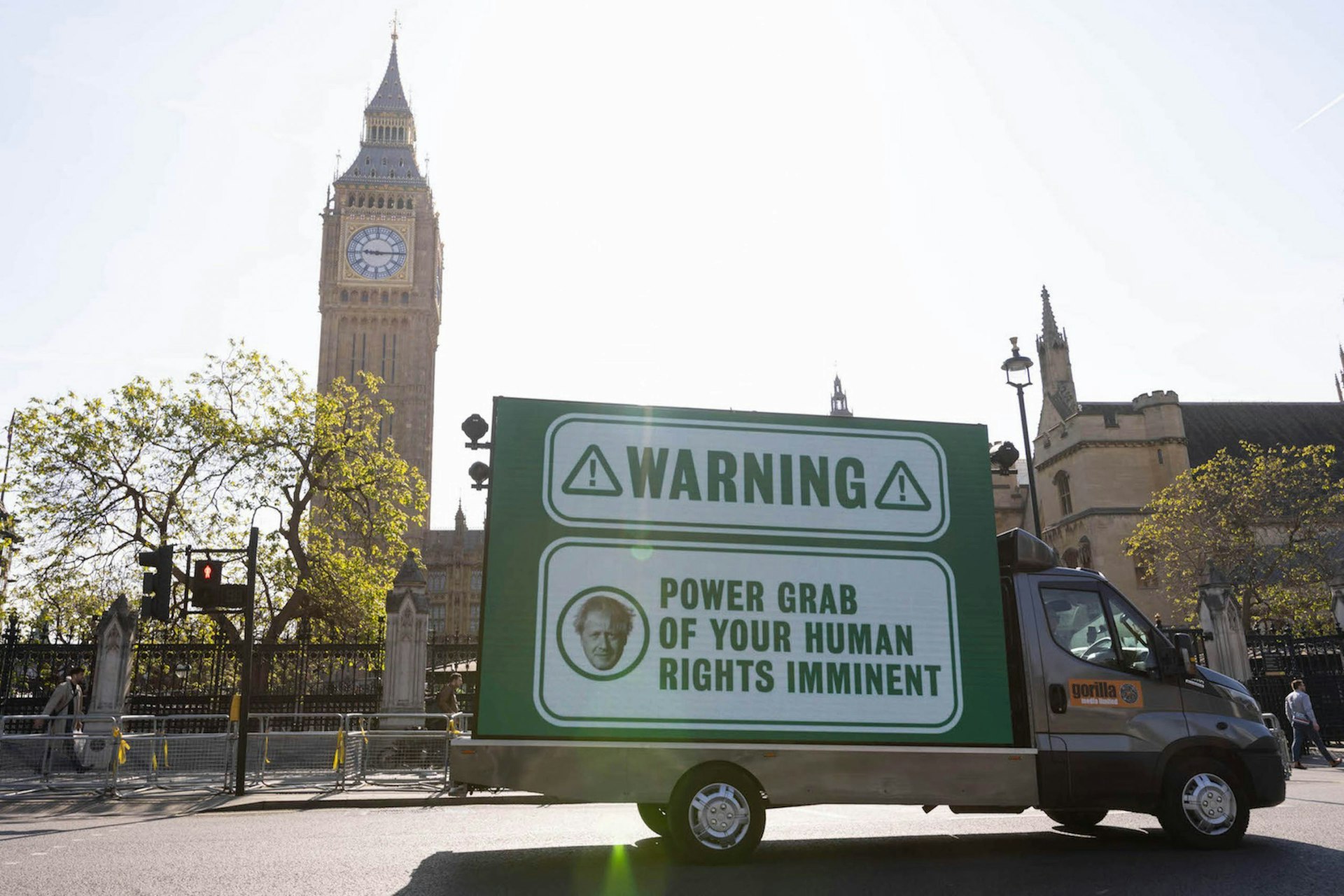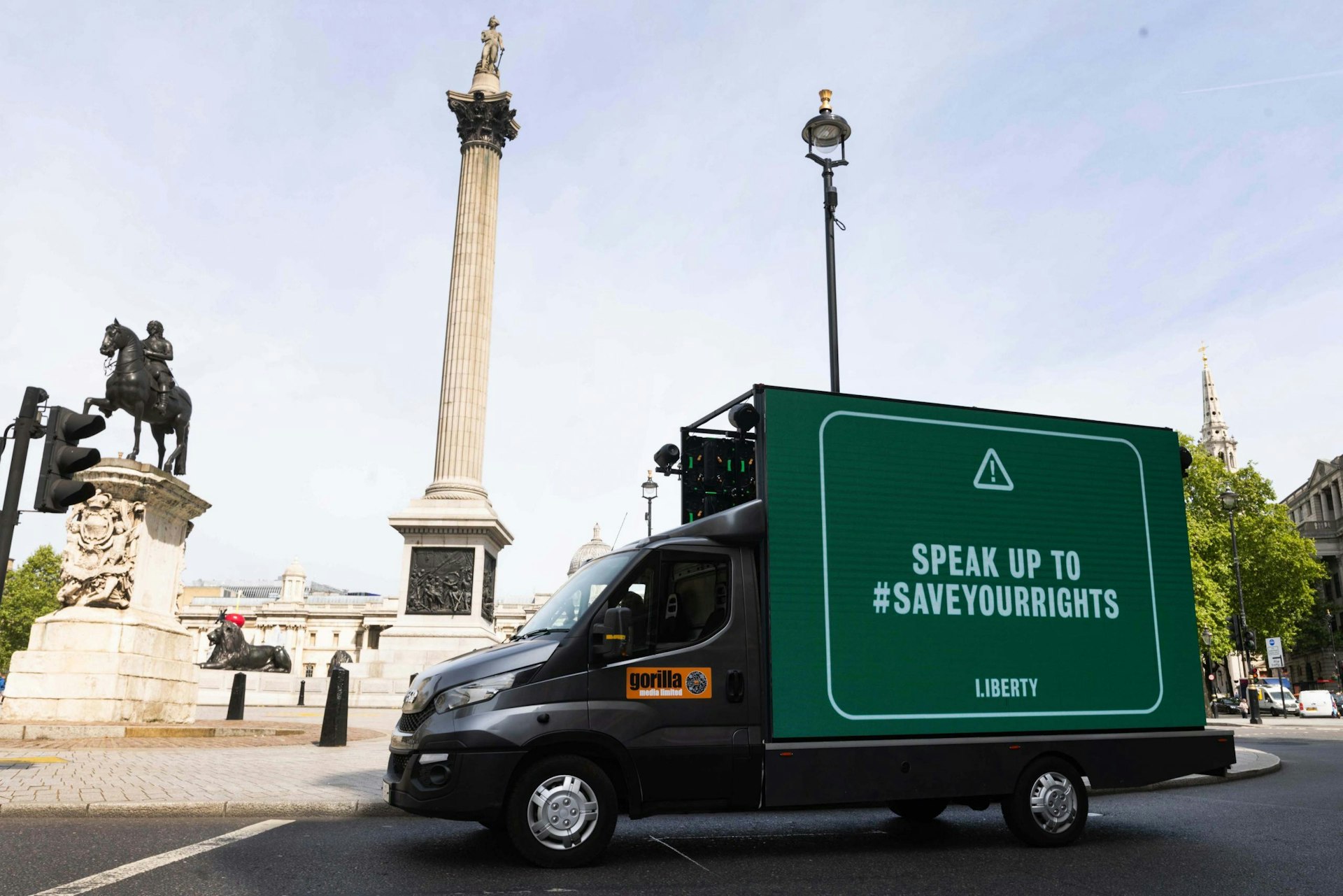Why the Tories want to rip up our human rights
- Text by Martha Spurrier
- Photography by David Parry

In the Queen’s Speech today, the government announced its long-anticipated plans to scrap the Human Rights Act, replacing it with a so-called ‘Bill of Rights.’ Ignore the spin: this is a power grab from a government determined to take away the power of ordinary people to challenge injustice, and it will hit marginalised communities hardest.
The Human Rights Act protects everyone’s rights and is a vital safeguard enabling people to stand up to power. An independent review set up by the government found no significant case for an overhaul, but the government simply ignored it. Now, the government plans to create a two-tier system in which some people are more deserving of rights than others. In doing so, it will put everyone’s rights at risk.
The Human Rights Act requires public bodies – whether that’s police, prisons, hospitals or schools – to respect our rights. But now, the government is trying to weaken the ‘positive obligations’ that require them to actively safeguard people’s rights. Without these safeguards, the families of those who died in the Hillsborough disaster wouldn’t have gotten justice, survivors of sexual assault at the hands of John Worboys wouldn’t have been able to hold the police to account for their failure to bring Worboys to justice, and disabled people wouldn’t have been able to challenge unlawful ‘do not resuscitate’ notices placed on them during the pandemic.

As well as taking away these obligations to protect rights, the government’s proposal will also make rights conditional on good behaviour – going against the whole point of universal human rights. Throughout the process of coming up with these proposals, ministers have sought to portray certain groups of people – like migrants and prisoners – as ‘undeserving’ of rights. Under their plans, those who the state deems to have ‘behaved badly’ could be stopped from receiving remedies they would otherwise be entitled to if they win a human rights claim.
But we know that people who the state thinks behave badly are also those who are most likely to be treated badly by the state and other public bodies. Ripping up the Human Rights Act and replacing it with a two-tier system means human rights abuses – like abuses in custody, for example – will be inflicted with impunity.
As if these proposals weren’t bad enough, the government also want to make it harder for anyone to bring a human rights claim to court. Their plans would introduce a “permission stage” so that people can only bring claims if they can show they have suffered a “significant disadvantage” or their case has “overriding public importance”. For example, a case could be refused if you are not able to provide evidence even if that evidence is simply not available to you at that time – such as CCTV from a police station or prison cell, which would only be disclosed once the case went ahead.
But any violation of human rights is a serious issue – and often in human rights cases, vital evidence of rights abuses only comes to light when the case goes to trial, meaning that if there had been a permission stage, many serious and important cases would never have seen the light of day.
If these proposals are so damaging, why is the government trying to introduce them? It’s no accident that these plans are being brought in at the same time as legislation to hand more powers to the police, as well as laws that will make it harder for millions to vote.
For the 23 years I’ve been a barrister Human Rights Act has provided the framework for the standards and protections that we can all live by and enjoy, such as right to life, justice, free speech – the Tories decision to repeal is an act of monumental legal and social vandalism. pic.twitter.com/lWoH3veCSM
— Gareth Roberts (@GarethRoberts3) May 10, 2022
This is a government that hates scrutiny and wants to shield itself from accountability. These plans will lead to untold abuses of power and injustice, and sideline parliament – leaving whatever party is in power to act as it pleases. Those already at the sharp end of state power will be hit hardest, but all our rights – and our ability to stand up against injustice – will be at risk.
But we are not powerless. This is a government famous for U-turns and buckling under pressure. The enormous resistance to the Policing Bill – with thousands taking to the streets, signing petitions, and making their opposition heard – resulted in some of the worst aspects of the Bill being stripped out. The government are now trying to reintroduce some of those dangerous measures – but they will once again be met with serious resistance.
In the months ahead, Liberty will be fighting alongside grassroots groups, Parliamentarians from all parties, and people from across society to make it clear that we won’t tolerate this assault on our rights.
Martha Spurrier is the Director of Liberty. Follow her on Twitter.
Enjoyed this article? Like Huck on Facebook or follow us on Twitter and Instagram.
Latest on Huck

As Tbilisi’s famed nightclubs reawaken, a murky future awaits
Spaces Between the Beats — Since Georgia’s ruling party suspended plans for EU accession, protests have continued in the capital, with nightclubs shutting in solidarity. Victor Swezey reported on their New Year’s Eve reopening, finding a mix of anxiety, catharsis and defiance.
Written by: Victor Swezey

Los Angeles is burning: Rick Castro on fleeing his home once again
Braver New World — In 2020, the photographer fled the Bobcat Fire in San Bernardino to his East Hollywood home, sparking the inspiration for an unsettling photo series. Now, while preparing for its exhibition, he has had to leave once again, returning to the mountains.
Written by: Miss Rosen

Ghais Guevara: “Rap is a pinnacle of our culture”
What Made Me — In our new series, we ask artists and rebels about the forces and experiences that have shaped who they are. First up, Philadelphian rap experimentalist Ghais Guevara.
Written by: Ghais Guevara

Gaza Biennale comes to London in ICA protest
Art and action — The global project, which presents the work of over 60 Palestinian artists, will be on view outside the art institution in protest of an exhibition funded by Bloomberg Philanthropies.
Written by: Cyna Mirzai

Ragnar Axelsson’s thawing vision of Arctic life
At the Edge of the World — For over four decades, the Icelandic photographer has been journeying to the tip of the earth and documenting its communities. A new exhibition dives into his archive.
Written by: Cyna Mirzai

ATMs & lion dens: What happens to Christmas trees after the holiday season?
O Tannenbaum — Nikita Teryoshin’s new photobook explores the surreal places that the festive centrepieces find themselves in around Berlin, while winking to the absurdity of capitalism.
Written by: Isaac Muk